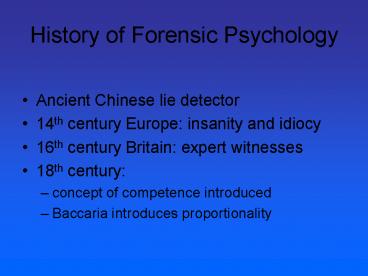History of Forensic Psychology - PowerPoint PPT Presentation
1 / 9
Title:
History of Forensic Psychology
Description:
History of Forensic Psychology Ancient Chinese lie detector 14th century Europe: insanity and idiocy 16th century Britain: expert witnesses 18th century: – PowerPoint PPT presentation
Number of Views:388
Avg rating:3.0/5.0
Title: History of Forensic Psychology
1
History of Forensic Psychology
- Ancient Chinese lie detector
- 14th century Europe insanity and idiocy
- 16th century Britain expert witnesses
- 18th century
- concept of competence introduced
- Baccaria introduces proportionality
2
History (continued)
- 19th century
- Professional assessors of competence
- Wundt introduces scientific psychology
- Ebbinghaus studies human memory
- Schrenk-Nortzing first forensic psychology case
- Introduction of geographical profiling
- Introduction of psychological testing
3
History (continued)
- 20th century
- Nature/nurture controversy
- Munstenberg introduces forensic psychology in
civil cases - 21st century
- Professionalization of psychology
- 1932 1st forensic text
- WWII study of battle fatigue (PTSD)
4
History (continued)
- 1950s research on the validity and reliability
of witnesses - 1960s research on rape and child sexual abuse
- 1970s Vietnam Vets syndrome (PTSD)
- 1980s research on divorce
- 1980s and 1990s studies on recovered memory
syndrome - Todays status of forensic psychology
5
Forensic Psychology Today
PSYCHOLOGICAL INFORMATION TO FACILITATE LEGAL
DECISION-MAKING
- Clinical/Police
- Human Relations Experts
- Social
- Counseling
- Correctional
- Behavioural specialists
- Organizational
- Developmental
- Pure applied research
- Clinicians
- Consultation to police depts.
- Mediation for litigating parties
- Role-playing juries
- Risk assessment
- Competence/offender programs
- Profiling
- Assess social penal programs
- Neglect, physical sexual abuse
- Scientific data preparation
- Develop treatment programs
6
Theories of Crime (1)
- Classical school of criminology
- Emphasized concept of free will
- People CHOSE to become criminals
- Positivist school of crimilogy
- Use of the scientific method to determine causes
of crime - Biological theories
- Constitutional theory Sheldon
- Aggressive delinquents tend to be mesomorphs
- Usually because they were early adolescents
7
Theories of Crime (2)
- Nature/Nurture issue
- Adoptive studies
- Twin studies H-factor
- What is inherited? Learning disabilities, frontal
lobe issues and autonomic arousal problems,
hormonal problems - Impulsivity
- Difficulties learning
- Excessive emotional reactivity
8
Theories of Crime (3)
- Sociological theories
- Structural problems in society
- Anomie
- Karen Horney approach-approach and
avoidance-avoidance conflicts (eg elevator
experiment) - Competition vs. brotherly love
- Theory of differential opportunity
- All people are equal but some more equal than
others - Credential society and the vertical mosaic
9
Theories of Crime (4)
- Reaction formation crime
- Active rejection of middle-class values
- Rational crime
- Reinforced behaviour for crime
- Eg. Welfare cheating
- Subcultural crime
- Norms of the subgroup are different from the
legislative majority (eg. Male and female
circumcision)































